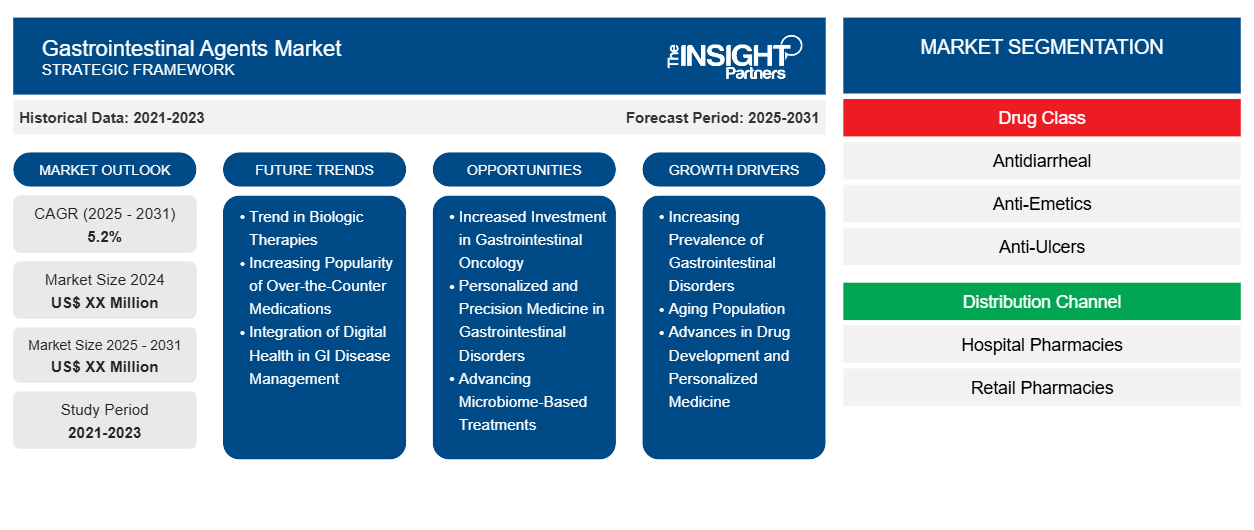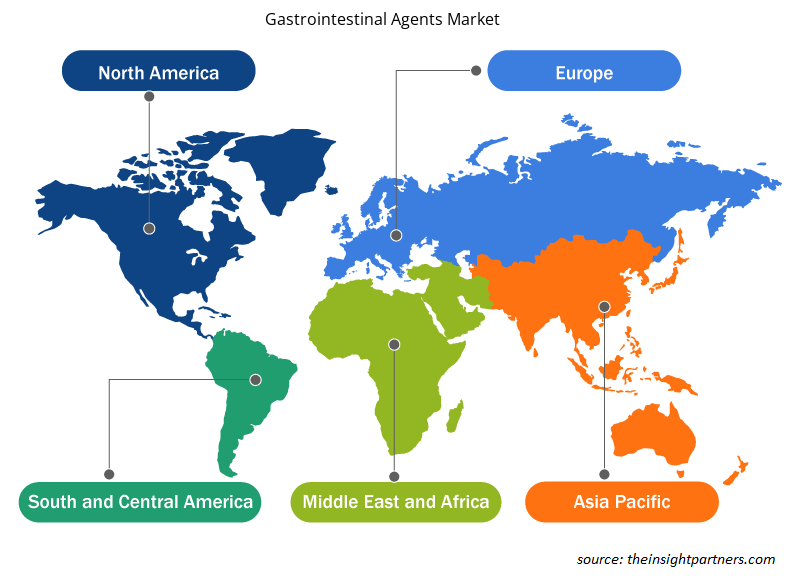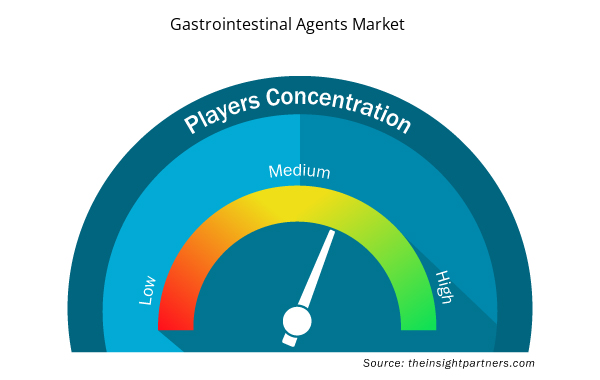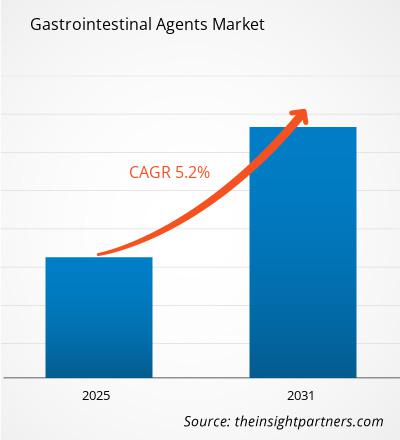The Gastrointestinal Agents Market is expected to register a CAGR of 5.2% from 2025 to 2031, with a market size expanding from US$ XX Million in 2024 to US$ XX Million by 2031.
The research report on the Gastrointestinal Agents Market is segmented by type into antacids, proton pump inhibitors (PPIs), laxatives, and anti-diarrheal agents. Applications analyzed include acid reflux treatment, irritable bowel syndrome (IBS) management, gastrointestinal infections, and constipation relief. End-users include pharmaceutical companies, hospitals, clinics, and healthcare providers. The regional analysis covers key markets such as North America, Europe, Asia Pacific, the Middle East and Africa, and South America. The market evaluation is presented in US$ for all segmental analyses. This report explores the rising prevalence of gastrointestinal disorders, the growing demand for over-the-counter GI treatments, and innovative therapies for chronic conditions like IBS.
Purpose of the Report
The report Gastrointestinal Agents Market by The Insight Partners aims to describe the present landscape and future growth, top driving factors, challenges, and opportunities. This will provide insights to various business stakeholders, such as:
- Technology Providers/Manufacturers: To understand the evolving market dynamics and know the potential growth opportunities, enabling them to make informed strategic decisions.
- Investors: To conduct a comprehensive trend analysis regarding the market growth rate, market financial projections, and opportunities that exist across the value chain.
- Regulatory bodies: To regulate policies and police activities in the market with the aim of minimizing abuse, preserving investor trust and confidence, and upholding the integrity and stability of the market.
Gastrointestinal Agents Market Segmentation
Drug Class
- Antidiarrheal
- Anti-Emetics
- Anti-Ulcers
- Laxatives
Distribution Channel
- Hospital Pharmacies
- Retail Pharmacies
Customize This Report To Suit Your Requirement
You will get customization on any report - free of charge - including parts of this report, or country-level analysis, Excel Data pack, as well as avail great offers and discounts for start-ups & universities
Gastrointestinal Agents Market: Strategic Insights

- Get Top Key Market Trends of this report.This FREE sample will include data analysis, ranging from market trends to estimates and forecasts.
Gastrointestinal Agents Market Growth Drivers
- Increasing Prevalence of Gastrointestinal Disorders:
The rising incidence of GI disorders, such as IBS, GERD, IBD, and gastrointestinal malignancies, is one of the key factors contributing to the growth of the gastrointestinal agents market. According to an estimate by the World Gastroenterology Organization, more than 20% of the population worldwide suffer from some kind of gastrointestinal disorder. With the prevalence of IBS and GERD on the rise, coupled with unhygienic eating and sedentary living, the demand for GI agents has also started to increase. Therefore, medications that manage these disorders, which include PPIs, antacids, anti-inflammatory drugs, and laxatives, stand in a fast-growing market. Furthermore, increased cases of GI cancers, especially colorectal cancer, create more demand for therapeutic options.
- Aging Population: With the aging of the population worldwide, there is a high predisposition to gastrointestinal disorders, especially those affecting the aging digestive system, which includes constipation, GERD, and diverticular disease. According to the United Nations, the population aged 60 years and above in the world is expected to reach 2.1 billion by 2050, thus driving the gastrointestinal agents market. This, therefore, makes the elderly more susceptible to age-related GI conditions; most of these conditions require management that is long-term and therefore increases demand for drugs and therapies that can manage such a condition. The aging population, therefore, forms a significant segment of the market in terms of developing drugs to address gastrointestinal disorders, prokinetic agents, laxatives, and antacids.
- Advances in Drug Development and Personalized Medicine:
New drug development within the gastrointestinal therapeutic area, especially in personalized medicine, has become a driving factor in the market. Advances in molecular biology, genetic testing, and biotechnology are allowing for targeted therapies for Crohn's disease, ulcerative colitis, and IBS. Newer biologics include monoclonal antibodies and immunotherapies that are significantly more effective and personalized compared to conventional drugs. For instance, Vedolizumab and Ustekinumab have completely revolutionized the treatment of IBD with targeted intervention on very specific inflammatory pathways. But novel drug delivery systems, like extended-release formulation and gastro-retentive systems, have also contributed to this market, improving both the efficacy and safety profiles of treatments.
Gastrointestinal Agents Market Future Trends
- Trend in Biologic Therapies: A major factor contributing to the trends in the gastrointestinal agents market is the gradual movement toward use of biologic therapies instead of traditional small molecule drugs. Especially in the field of IBD, which includes Crohn's disease and ulcerative colitis, biologic therapies are more in demand. Biologics, including monoclonal antibodies and immunosuppressive agents, have transformed the management of these chronic, immune-mediated diseases. These are therapies targeting specific components of the immune system that drive inflammation in the gastrointestinal tract, offering better long-term disease management and remission. Monoclonal antibodies, such as infliximab and adalimumab, have significantly improved outcomes, especially for patients with severe or refractory disease. With the availability of more biologic therapies, they will eventually replace traditional treatments, particularly steroids, which have a host of long-term side effects. This trend has improved the treatment patterns for better clinical outcomes in patients with IBD and other chronic GI disorders.
- Increasing Popularity of Over-the-Counter Medications:
Over-the-counter gastrointestinal agents are gaining increasing popularity as people take a more proactive interest in maintaining their digestive health. Over-the-counter medications for common GI complaints like heartburn, indigestion, constipation, and diarrhea are rather easy to access and offer immediate relief to patients who would not want to seek medical help for minor ailments. It has been more pronounced in developed markets, where the trend of opting for self-care regarding non-severe GI symptoms has been growingly popular among patients. Indeed, the convenience, affordability, and efficiency of PPIs, H2 blockers, fiber supplements, and antacids make them very popular among consumers. Furthermore, with increasing awareness among consumers about gastrointestinal health, the trend of using OTC products not only for therapeutic purposes but also for prevention is gaining wide acceptance and hence widening the scope of these products in the market.
- Integration of Digital Health in GI Disease Management:
Digital health technologies are increasingly being integrated into the management of gastrointestinal diseases, offering both patients and healthcare providers tools for better monitoring and disease management. Mobile apps, telemedicine services, and wearable devices are now being used to track GI symptoms, monitor medication adherence, and provide real-time health data to healthcare providers. For instance, symptom-tracking applications for conditions such as IBS or IBD support the identification of triggers, enhance treatment plans, and provide feedback to physicians on personalized care. The rise of telemedicine further enables patients to consult healthcare providers remotely, increasing access and convenience in gastrointestinal care. These technologies not only support disease management but also enhance patient engagement and improve overall treatment adherence. This trend is anticipated to play an increasingly larger role in the management of gastrointestinal disease as more health care systems are embracing digital health solutions.
Gastrointestinal Agents Market Opportunities
- Increased Investment in Gastrointestinal Oncology:
Gastrointestinal oncology represents a major growing segment within the broader gastrointestinal agents market. GI cancers, such as colorectal cancer, pancreatic cancer, and esophageal cancer, are increasing worldwide due to factors related to aging of the population, lifestyles, and genetic predisposition. These malignancies usually require specific therapies that include chemotherapy, targeted treatments, and immunotherapy. This development of biologic agents specifically targeting cancer cells in the GI tract is opening new avenues toward more effective and personalized treatment options. Furthermore, early detection methodologies, including genetic testing and non-invasive screening technologies, should spur further demand for advanced GI oncology treatments. Companies that invest in developing novel therapies for GI cancers, including immune checkpoint inhibitors and biologics, will have significant opportunities to capitalize on this growing segment of the market.
- Personalized and Precision Medicine in Gastrointestinal Disorders:
Personalized and precision medicine is one of the fastest-growing fields in treating gastrointestinal disorders. Advances in genomics and molecular diagnostics are making it possible to treat GI diseases with increasing precision, based on a person's genetic makeup and characteristics of the disease. For example, genetic testing for IBS, IBD, and celiac disease allows targeted therapies which may provide more effective interventions with fewer side effects. Personal treatments based on a patient's individual molecular and genetic profile will finally allow the healthcare provider to order medications and interventions that will be best for that particular patient. It is expected to revolutionize the management of chronic GI disorders, improving patient outcomes and reducing healthcare costs. As the understanding of the human microbiome and its role in gastrointestinal health advances, personalized medicine will also be an ever greater opportunity for pharmaceutical companies in the GI space.
- Advancing Microbiome-Based Treatments:
The human gut microbiome plays an important role in gastrointestinal health, immune function, and overall well-being. Research into the microbiome's influence on conditions such as IBS, IBD, and even colorectal cancer is opening up new avenues of opportunity for microbiome-based treatments. Probiotics, prebiotics, and FMT are emerging as promising therapies for GI disorders, showing promise in studies for symptom improvement and disease management. The development of drugs that target the modulation of the microbiome to restore balance and improve gut health is an exciting area of growth in the GI market. Companies willing to invest in microbiome-based therapies and diagnostics will be well-positioned to capitalize on this emerging trend that might just revolutionize the treatment of chronic gastrointestinal conditions.
Gastrointestinal Agents Market Regional Insights
The regional trends and factors influencing the Gastrointestinal Agents Market throughout the forecast period have been thoroughly explained by the analysts at Insight Partners. This section also discusses Gastrointestinal Agents Market segments and geography across North America, Europe, Asia Pacific, Middle East and Africa, and South and Central America.

- Get the Regional Specific Data for Gastrointestinal Agents Market
Gastrointestinal Agents Market Report Scope
| Report Attribute | Details |
|---|---|
| Market size in 2024 | US$ XX Million |
| Market Size by 2031 | US$ XX Million |
| Global CAGR (2025 - 2031) | 5.2% |
| Historical Data | 2021-2023 |
| Forecast period | 2025-2031 |
| Segments Covered |
By Drug Class
|
| Regions and Countries Covered | North America
|
| Market leaders and key company profiles |
Gastrointestinal Agents Market Players Density: Understanding Its Impact on Business Dynamics
The Gastrointestinal Agents Market market is growing rapidly, driven by increasing end-user demand due to factors such as evolving consumer preferences, technological advancements, and greater awareness of the product's benefits. As demand rises, businesses are expanding their offerings, innovating to meet consumer needs, and capitalizing on emerging trends, which further fuels market growth.
Market players density refers to the distribution of firms or companies operating within a particular market or industry. It indicates how many competitors (market players) are present in a given market space relative to its size or total market value.
Major Companies operating in the Gastrointestinal Agents Market are:
- Abbott Laboratories
- AllerganPlc
- AstraZeneca
- BayerAG
- BoehringerIngelheimGmbH
- GlaxoSmithKlinePlc
Disclaimer: The companies listed above are not ranked in any particular order.

- Get the Gastrointestinal Agents Market top key players overview
Key Selling Points
- Comprehensive Coverage: The report comprehensively covers the analysis of products, services, types, and end users of the Gastrointestinal Agents Market, providing a holistic landscape.
- Expert Analysis: The report is compiled based on the in-depth understanding of industry experts and analysts.
- Up-to-date Information: The report assures business relevance due to its coverage of recent information and data trends.
- Customization Options: This report can be customized to cater to specific client requirements and suit the business strategies aptly.
The research report on the Gastrointestinal Agents Market can, therefore, help spearhead the trail of decoding and understanding the industry scenario and growth prospects. Although there can be a few valid concerns, the overall benefits of this report tend to outweigh the disadvantages.
- Historical Analysis (2 Years), Base Year, Forecast (7 Years) with CAGR
- PEST and SWOT Analysis
- Market Size Value / Volume - Global, Regional, Country
- Industry and Competitive Landscape
- Excel Dataset



Report Coverage
Revenue forecast, Company Analysis, Industry landscape, Growth factors, and Trends

Segment Covered
This text is related
to segments covered.

Regional Scope
North America, Europe, Asia Pacific, Middle East & Africa, South & Central America

Country Scope
This text is related
to country scope.
Frequently Asked Questions
The Gastrointestinal Agents Market is expected to register a CAGR of 5.2% from 2025-2031.
The major driving factors supporting the Gastrointestinal Agents Market growth are- Increasing Prevalence of Gastrointestinal Disorders, Aging Population, and Advances in Drug Development and Personalized Medicine
Key Future Trends in the Gastrointestinal Agents Market are- Trend in Biologic Therapies and Integration of Digital Health in GI Disease Management
Key companies in Gastrointestinal Agents Market are - Abbott Laboratories , AllerganPlc , AstraZeneca , BayerAG , BoehringerIngelheimGmbH , GlaxoSmithKlinePlc , JanssenBiotechInc , RanbaxyLaboratoriesLimited , Sanofi
The report can be delivered in PDF/PPT format; we can also share excel dataset based on the request.
Some of the customization options available based on request are additional 3–5 company profiles and country-specific analysis of 3–5 countries of your choice. Customizations are to be requested/discussed before making final order confirmation, as our team would review the same and check the feasibility.
Trends and growth analysis reports related to Life Sciences : READ MORE..
1. Abbott Laboratories
2. Allergan Plc.
3. AstraZeneca
4. Bayer AG
5. Boehringer Ingelheim GmbH
6. GlaxoSmithKline plc.
7. Janssen Biotech, Inc.
8. Ranbaxy Laboratories Limited
9. Sanofi
10. Takeda Pharmaceutical

 Get Free Sample For
Get Free Sample For